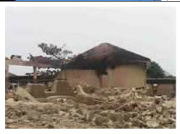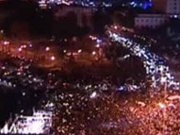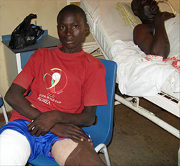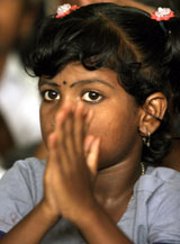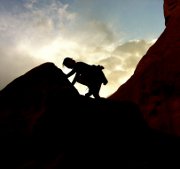In Zanzibar, two church buildings razed; in Comoros, a Christian suffers disease, shunning.
NAIROBI, Kenya, January 13 (CDN) — Far from the world media’s gaze in remote islands off the eastern coast of Africa, church buildings are razed and Christians are ostracized and imprisoned for their faith – leaving one with a skin disease.On Tanzania’s island of Zanzibar, in one week-long stretch last month Muslim extremists destroyed two church buildings, Christian leaders said. The extremists torched the building of the Pentecostal Evangelical Fellowship of Africa in Mtufani Mwera, about 12 kilometers (seven miles) from Zanzibar town, at 7 p.m. on Dec. 3, said Pastor Julius Makoho. Damages were estimated at 1.5 million Tanzania shillings (US$9,350).
“When I arrived at the scene of incident Sunday morning, I found that the church had been reduced to ashes, with bottles seen close by that could be petrol or paraffin that could have been used for the burning of the church building,” Pastor Makoho said.
As the assailants fled, said one church member who requested anonymity, “I heard them shouting, ‘We do not want a church in this area!’”
To date no arrests have been made.
Daniel Kwilembe, bishop of the 80-member church, said authorities on the predominantly Muslim archipelago tend to take no action in crimes against Christians. Bishop Fabian Obedi of the Pentecostal Evangelical Church of Zanzibar concurred.
“The Muslims are burning our church buildings quite frequently here in Zanzibar, but the government is not speaking against this kind of destruction of our church premises,” Bishop Obedi said.
The previous week in Kianga, about 10 kilometers (six miles) from Zanzibar town, a throng of Islamic extremists demolished Siloam Church’s building. Pastor Boniface Kaliabukama said that more than 100 Muslim extremists arrived at the church compound on Nov. 26 chanting “Allahu Akbar [God is greater].”
“The security guard got scared of the mob and fled for his life,” Pastor Kaliabukama said.
The assailants entered the church building with clubs, hammers, torches and swords, tearing it down in about three hours, the pastor said. The arrival of police did not stop them; they kept slamming the structure even as police tried to frighten them off by firing into the air, he said. Officers did manage to arrest group leader Mbarak Hamadi, 60.
“When the church assembly arrived at the church for church service, there was no shelter for them to worship in,” said Pastor Kaliabukama. Siloam Church has a congregation of about 200 members.
Bishop Obedi confirmed the attack, saying that a neighbor called him the night of the incident to tell him that he had heard a Muslim saying, “We are not comfortable with the existence of the Siloam Church – this church is growing very fast, and it is taking some of our Muslim brethren.”
Damages to the brick structure with its sheet-iron roof, completed in August 2011, were estimated at 25 million Tanzanian shillings (US$15,570).
“The government had permitted us to put up the church structure,” Pastor Kaliabukama said. “But these Muslims have no regard to the law. What will be the fate of my church members?”
Zanzibar Island’s population is estimated at 700,000. There are only 60 Christian congregations on the archipelago, according to Operation World. The Zanzibar archipelago united with Tanganyika to form the present day Tanzania in 1964.
On July 30, Muslim extremists burned down a church building in Fuoni, on the south coast of Zanzibar island, that belonged to the Evangelical Assemblies of God-Tanzania. In Kianga, another church building was burned down on July 27, and on neighboring Pemba Island, suspected Muslims extremists in Konde on June 17 razed a Seventh-day Adventist Church building.
Skin Disease
Further south, in Comoros – three tiny islands between Mozambique and Madagascar that declared independence from France in 1975 – a convert from Islam is suffering from a skin disease contracted in prison after his family threw him out.
The ordeal of Musta Kim began in March 2010 when, returning from an overnight prayer meeting, he found someone had broken into his house in Mdjwayezi village. What he thought would be a simple matter of reporting a burglary turned him into an outcast.
While looking for evidence in his home, police stumbled onto Christian materials – a Bible and film – which changed the course of inquiry from pursuing thieves to asking why Kim was practicing a forbidden faith.
The Muslim youth who broke into his home was suspicious that Kim had left Islam, Kim said. Police investigations following the March 4 ransacking lasted three months, and among the Christian materials officers found was the “Jesus Film,” a translation of the Gospel of Luke in the local Ngazidja language and a French Bible.
With the help of Kim’s family, police arrested him and severely beat him during interrogation, injuring his right eye, before throwing him into a jail cell, he said. He slept on a moist thin mattress in the filthy jail cell, leaving him with a skin disease that has affected his whole body. He also developed a serious infection on his navel, with secretion of pus, which required urgent attention.
Kim was rushed to the Roman Catholic Hospital in Mboeni, but his condition worsened, with his skin ailment resembling scabies. He began scratching himself continuously, leading to serious bleeding, and went sleepless nights in intense pain throughout his body, he said.
His health deteriorating, he made an appeal in the high court regarding his eight months of incarceration without trial, and he was released on Feb. 29, 2011.
His family, however, rejected him, and Kim did not know who to turn to for shelter, medicine and food, he said.
“I cannot sleep at night – the whole body is itching and hurting,” he said. “I need medical assistance – my family has deserted me.”
Hailing from Mdjwayezi village 20 kilometers from Moroni town, Kim is an active member of the underground church.
The Comorian constitution provides for freedom of religion, though it is routinely violated. Islam is the legal religion, and anyone found practicing another faith faces opposition. Evangelism is forbidden, and converts to Christianity can expect severe reprisals, according to Operation World, which states that the country is 98.84 percent Muslim and 0.93 percent Christian.
END



